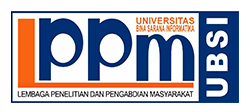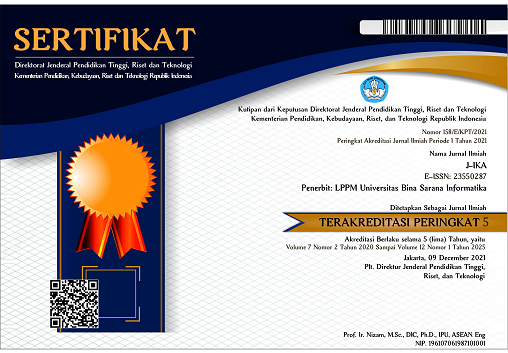Pengembangan Model Social Media Marketing dan Keputusan Berkunjung: Sebuah Pendekatan Konseptual
Sari
Teks Lengkap:
PDFReferensi
Asseraf, Y., and A. Shoham. 2017. Destination branding: The role of consumer affinity. Journal of Destination Marketing & Management 6 (4):375-384.
Bae, J., and B.-D. Kim. 2013. IS THE ELECTRONIC WORD OF MOUTH EFFECT ALWAYS POSITIVE ON THE MOVIE? Academy of Marketing Studies Journal 17 (1).
Duffett, R. G. 2017. Influence of social media marketing communications on young consumers’ attitudes. Young Consumers 18 (1):19-39.
Echtermeyer, M. 2008. Brands as Destinations – The New Tourism Objective for Chinese Tourists. Stockinger, J.
Echtner, C. M, and J. R. B. Ritchie. 2003. The meaning and measurement of destination image. The Journal of Tourism Studies 14 (1).
Ge, J., U. Gretzel, and R. J. Clarke. 2013. Strategic Use of Social Media Affordances for Marketing: A Case Study of Chinese DMOs. Information and Communication Technologies in Tourism.
González-Rodríguez, M. R., R. Martínez-Torres, and S. Toral. 2016. Post-visit and pre-visit tourist destination image through eWOM sentiment analysis and perceived helpfulness. International Journal of Contemporary Hospitality Management 28 (11):2609-2627.
Hailin, Q., K. L. Hyunjung, and I. H. Hyunjung. 2011. A model of destination branding: Integrating the concepts of the branding and destination image. Tourism Management 32 (3):465-476.
Hennig-Thurau, T., S. Fuchs, and M. B. Houston. 2013. What's a Movie Worth? Determining the Monetary Value of Motion Pictures' TV rights. International Journal of Arts Management 15 (3).
Huertas, A., and E. Marine-Roig. 2015. User reactions to destination brand contents in social media. Information Technology & Tourism 15 (4):291-315.
Iza, N. 2017. Pariwisata Sumbang Devisa Terbesar Kedua. Kementerian Komunikasi dan Informatika Republik Indonesia.
Jeong, H.-J., and D.-M. Koo. 2015. Combined effects of valence and attributes of e-WOM on consumer judgment for message and product: The moderating effect of brand community type. Internet Research 25 (1):2-29.
Kalyanam, K., and S. McIntyre. 2002. The E-marketing Mix: A Contribution of the E-tailing Wars. Journal of the Academy of Marketing Science 30 (4).
Kang, M., and D.-H. Shin. 2016. The effect of customers’ perceived benefits on virtual brand community loyalty. Online Information Review 40 (3):298-315.
Kotler, P., and K. L. Keller. 2016. Marketing Management. edited by 15th: Pearson Education, Inc.
Lim, Y., Y. Chung, and P. A. Weaver. 2012. The impact of social media on destination branding. Journal of Vacation Marketing 18 (3):197-206.
Lončarić, D., I. Ribarić, and V. Farkaš. 2016. THE ROLE OF ELECTRONIC WORD-OF-MOUTH IN THE TOURISM MARKET. Tourism & Hospitality Industry:188-203.
Marchiori, E., L. Cantoni, and D. R. Fesenmaier. 2013. What did they say about us? Message Cues and Destination Reputation in Social Media. Information and CommunicationTechnologies in Tourism:170-182.
Marchioria, E., P. Milwood, and F. Zach. 2013. Drivers and Benefits of Analysing DMOs’ eWOM Activities. In Information and Communication Technologies in Tourism, edited by L. C. a. Z. X. (eds.): Springer-Verlag Berlin Heidelberg.
Minazzi, R. 2015. Social Media Marketing in Tourism and Hospitality. London: Springer Cham Heidelberg New York Dordrecht London.
Paul, P. 2006. Marketing on the Internet. Journal of Consumer Marketing 13 (4):27-39.
Prayogo, R. R., F. L. S. Ketaren, and R. M. Hati. 2016. Electronic Word Of Mouth, Destination Image, And Satisfaction Toward Visit Intention : An Empirical Study In Malioboro Street, Yogyakarta. Advances in Social Science, Education and Humanities Research (ASSEHR) 81.
Santos, G. E. d. O., and J. d. M. E. Giraldi. 2017. Reciprocal effect of tourist destinations on the strength of national tourism brands. Tourism Management 61:443-450.
Sashi, C. M. 2012. Customer engagement, buyer‐seller relationships, and social media. Management Decision 50 (2):253–272.
Sotiriadis, M. D., and C. v. Zyl. 2013. Electronic word-of-mouth and online reviews in tourism services: the use of twitter by tourists. Electron Commer Res 13:103-124.
Tham, A., G. Croy, and J. Mair. 2013. Social Media in Destination Choice: Distinctive Electronic Word-of-Mouth Dimensions. Journal of Travel & Tourism Marketing 30 (1-2):144-155.
Thurau, T. H., K. Gwinner, G. Walsh, and D. D. Gremler. 2004. Electronic Word-of-Mouth via Consumer-Opinion Platforms: What Motivates Consumers to Articulate Themselves on the Internet? Journal of Interactive Marketing 18 (1).
Todua, N. 2017. Social Media Marketing for Promoting Tourism Industry in Georgia. In The 22nd International Conference on Corporate and Marketing Communications
Challenges of Marketing Communications in a Globalized World. Faculty of Economics and Business, University of Zaragoza, Zaragoza (Spain), May 4-5, 2017.
Ukpabi, D., and H. Karjaluoto. 2017. Influence of Social Media on Corporate Heritage Tourism Brand.697-709.
Zhang, L. 2015. The effect of social media marketing on brand marketing and communication strategy: the case of Visit Denmark, Program: Communication and Business Studies, Roskilde University.
Zou, S. S. 2018. Marianna Sigala and Ulrike Gretzel (eds.): Advances in social media for travel, tourism and hospitality: new perspectives, practice and cases. Inf Technol Tourism 18:187-189.
DOI: https://doi.org/10.31294/kom.v5i2.4688
DOI (PDF): https://doi.org/10.31294/kom.v5i2.4688.g2811
| Index by: | ||
       | ||
| E-ISSN: 2549-3299 | ||
  | ||
Dipublikasikan oleh LPPM Universitas Bina Sarana InformatikaJl. Kramat Raya No.98, Kwitang, Kec. Senen, Kota Jakarta Pusat, DKI Jakarta 10450 |







